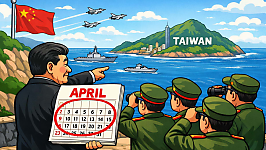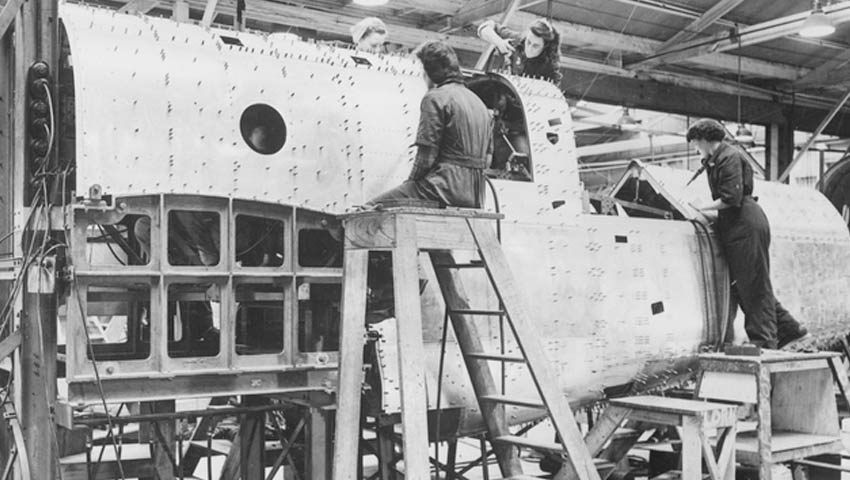When war came to Australia’s doorstep in 1940 the nation was in the early stages of a vast industrialisation effort to prepare the nation for conflict with Germany, not Imperial Japan. Today, the nation’s level of industrial preparedness is similarly underdeveloped, raising questions.
There is an old saying often attributed to Albert Einstein, which posits that "the definition of insanity is doing the same thing over and over again, but expecting different results".
Across the globe, the post-Second World War economic, political and strategic order appears to be in tatters, the impact of COVID-19 exposing over-dependence on global supply chains, asymmetric security threats, and political warfare combined with myriad challenges are all serving to impact the security and sovereignty of many nations, including Australia.
Further compounding these challenges is a growing sense of societal unrest and upheaval across many of the West's leading nations, from the US and UK to France and even in the streets of Australia's own capital cities.
Each of these individual factors have served to demonstrate the limitations of traditional statecraft and, perhaps most concerningly, have shaken the Australian public's confidence in the public policy status quo.
While we are far from the end, Australia's first recession in nearly three decades, the impacts are beginning to be felt and despite the best efforts of state, territory and Commonwealth governments, it will force a major restructuring of the national economy and Australia's relationships with both the broader global community and, more critically, our Indo-Pacific partners.
All of this combines to form one absolute realisation: Australia's record period of economic stability and prosperity buoyed by the immense mineral and resource wealth, combined with the benevolence of the post-Second World War political, economic and strategic order, is at an end – it's time to adjust accordingly.
In response, acclaimed Australian author, historian and philanthropist, Geoffrey Blainey, AC, penned a piece titled 'As the Pacific theatre opened, the nation was ill-prepared', which catalogues the comparable position the nation now finds itself in.
"Australia definitely was not as well prepared for World War II as for World War I. Whereas public opinion was strongly in favour of joining the war against Germany in 1914, it was more divided and less dedicated when the next war against Germany began in 1939," Blainey begins.
Expanding on this, Blainey turns his focus to Australia's contemporary reality, particularly as a result of the mounting great power tensions between the nation's primary economic and security partners, China and the US, respectively.
"Today the nation’s wartime crisis has largely been forgotten. Its sobering events are probably taught to only a fraction of those school students old enough to understand them. Of the adult population in this migrant country, more than half possess little or no knowledge of Australia’s plight in 1941-42," he says.
"Yet if it is true that an awkward period of confrontation between China and the US has begun, and if it is true that Australia has no chance of standing aside, then the lessons of 1941-42 should be remembered.
"In some circles today, there is more fear of a great-power war than in any year since the Cuban missile crisis of 1962, when the US came close to conflict with Russia. Several well-informed Australian observers liken the present situation in China’s seas to the perilous situation in Europe in the late 1930s. Scott Morrison has spoken about 'the radical uncertainty we face, eerily haunted by similar times many years ago in the 1930s'."
Industrial innovation in response to mounting tensions
When war broke out in September 1939, Australia was committed to supporting the British war effort against Hitler's rampaging panzer divisions, with the nation recognising it would need its own industrial base to support military deployments in the European and Mediterranean theatre – as a result, then prime minister Robert Menzies and his successor John Curtin laid the foundations for Australia's industrialisation.
Blainey explains the shift in public policy, supported by industry, stating, "The leader of Australia’s industrial war-effort was Essington Lewis, an engineer and chief executive of BHP, whose extensive steelworks and allied factories were centred on Newcastle and Port Kembla.
"Visiting Japan for a fortnight in 1934 and closely inspecting many workplaces that were out of bounds to journalists, Lewis was surprised to discover that Japan 'was armed to the teeth'. In an emergency it could build 100 aircraft a day at a time when Australia had less than 50 active fighting planes.
"Back in Melbourne he formed a syndicate called the Commonwealth Aircraft Corporation, which in 1939 built the first Australian military aircraft, a simple, lightly armed trainer-plane called the Wirraway. Later came fighter bomber aircraft that really held their own. It was remarkable that we mass-produced planes before we mass-produced cars, the first being the now-nostalgic Holden.
"In 1940, Robert Menzies as prime minister had placed Lewis in charge of the nation’s industrial war-effort, and eventually a huge workforce of men and women were producing war equipment of a variety that surprised the few foreign industrialists who visited wartime Australia. Lewis, pre-modern in his business ethos, achieved this huge task without seeking payment from the government."
This immense effort, just three decades after the formation of the nation, stands as a testament to the capacity of Australia and Australians when pushed to action, however it is part of the equation.
War on our doorstep served as a catalyst
The rampaging conquest of south-east Asia by Imperial Japan came as a shock to the American, British and Australian military planners, the devastation of the US Pacific Fleet, the fall of Singapore and British 'Force Z' respectively in the final days of 1941 revealed the nation's startling vulnerability to great power rivals.
In particular, the attacks on Darwin and the roving raids conducted by Japanese submarines along the nation's coastline instilled a fear in the Australian public that promoted a robust response and the formation of a consistent policy basis for the post-war years.
This policy basis, one of increased self-reliance, didn't forgo the importance of a great power ally, rather it recognised that Australia needed to take a more direct hand in its own security, rather then abdicating that responsibility to nations who maybe hindered in their capacity to support and carry out the large-scale defence of Australia.
Blainey explains this recognition, saying, "Eventually Australia as a nation learned more from adversity than from victory. The fear it might be invaded again some day by an Asian power dominated the first 30 post-war years.
"Australia must have a larger population, and so the ambitious European migration scheme was conducted with skill. Australia had to be powerful industrially, and it became by 1970 far more self-sufficient than it is now. And Australia still realised how much it needed a reliable and powerful ally."
Blainey issues a challenge for Australia's public policy leaders, one that recognises the challenges of the rapidly deteriorating global order and the domestic, economic, political and security challenges, which while severe, present equal opportunity if we only would learn the lessons of the past.
Your thoughts
Australia is defined by its economic and strategic relationships with the Indo-Pacific and the access to the growing economies and to strategic sea lines of communication supporting over 90 per cent of global trade, a result of the cost-effective and reliable nature of sea transport.
Indo-Pacific Asia is at the epicentre of the 21st century’s era of great power competition and global maritime trade, with about US$5 trillion worth of trade flowing through the South China Sea and the strategic waterways and chokepoints of south-east Asia annually.
For Australia, a nation defined by this relationship with traditionally larger yet economically weaker regional neighbours, the growing economic prosperity of the region and corresponding arms build-up, combined with ancient and more recent enmities, competing geopolitical, economic and strategic interests, places the nation at the centre of the 21st century’s “great game”.
Enhancing Australia’s capacity to act as an independent power, incorporating great power-style strategic economic, diplomatic and military capability serves as a powerful symbol of Australia’s sovereignty and evolving responsibilities in supporting and enhancing the security and prosperity of Indo-Pacific Asia.
Australia is consistently told that as a nation we are torn between our economic relationship with China and the longstanding strategic partnership with the US, placing the country at the epicentre of a great power rivalry – but what if it didn’t have to be that way?
Get involved with the discussion and let us know your thoughts on Australia’s future role and position in the Indo-Pacific and what you would like to see from Australia’s political leaders in terms of shaking up the nation’s approach to our regional partners.
We would also like to hear your thoughts on the avenues Australia should pursue to support long-term economic growth and development in support of national security in the comments section below, or get in touch with
Stephen Kuper
Steve has an extensive career across government, defence industry and advocacy, having previously worked for cabinet ministers at both Federal and State levels.









